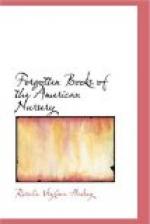THE TWITE
Green like the Linnet it appears
to sight,
And like the Linnet sings
from morn till night.
A reddish spot upon his rump
is seen,
Short is his bill, his feathers
always clean:
When other singing birds are
dull or nice,
To sing again the merry Twites
entice.
Reflections of the prevailing taste of grown people for biography are suggested in three little books, of two of which the author was Mrs. Pilkington, who had already written several successful stories for young ladies. Her “Biography for Girls” contains various novelettes, in each of which the heroine lives the conventional life and dies the conventional death of the period, and receives a laudatory epitaph. They are remarkable only as being devoid of any interest. Her “Biography for Boys” does not appear to have attained the same popularity as that for girls. A third book, “The Juvenile Biographers,” containing the “Lives of Little Masters and Misses,” is representative of the changes made in many books by the printer to cater to that pride in the young Republic so manifest in all local literary productions. In one biography we note a Representative to the Massachusetts Assembly:
“As Master Sammy had always been a very sober and careful child, and very attentive to his Books, it is no wonder that he proved, in the End, to be an excellent Scholar.
“Accordingly, when he had reached the age of fourteen, Mr. William Goodall, a wealthy merchant in the city of Boston, took him into his counting house, in order to bring him up in the merchantile Way, and thereby make his Fortune.
“This was a sad Stroke to his poor Sister Nancy, who having lost both her Papa and Mama, was now likely to lose her Brother likewise; but Sammy did all he could to appease her, and assured her, that he would spend all his leisure Time with her. This he most punctually performed, and never were Brother and Sister as happy in each other’s company as they were.
“Mr. William Goodall was highly satisfied with Sammy’s Behaviour, and dying much about the Time that Miss Nancy was married to the Gentleman, he left all his business to Sammy, together with a large Capital to carry it on. So much is Mr. Careful esteemed (for we must now no longer call him Master Sammy) that he was chosen in the late General Election, Representative in the General Court, for one of the first Towns in New England, without the least expense to himself. We here see what are the Effects of Good Behaviour.”
This adaptation of the English tale to the surroundings of the American child is often found in Thomas’s reprints, and naturally, owing to his enthusiasm over the recent change in the form of government, is made wholly by political references. Therefore while the lark and the linnet still sang in songs and the cowslips were scattered throughout the nature descriptions, Master Friendly no longer rode in the Lord Mayor’s




